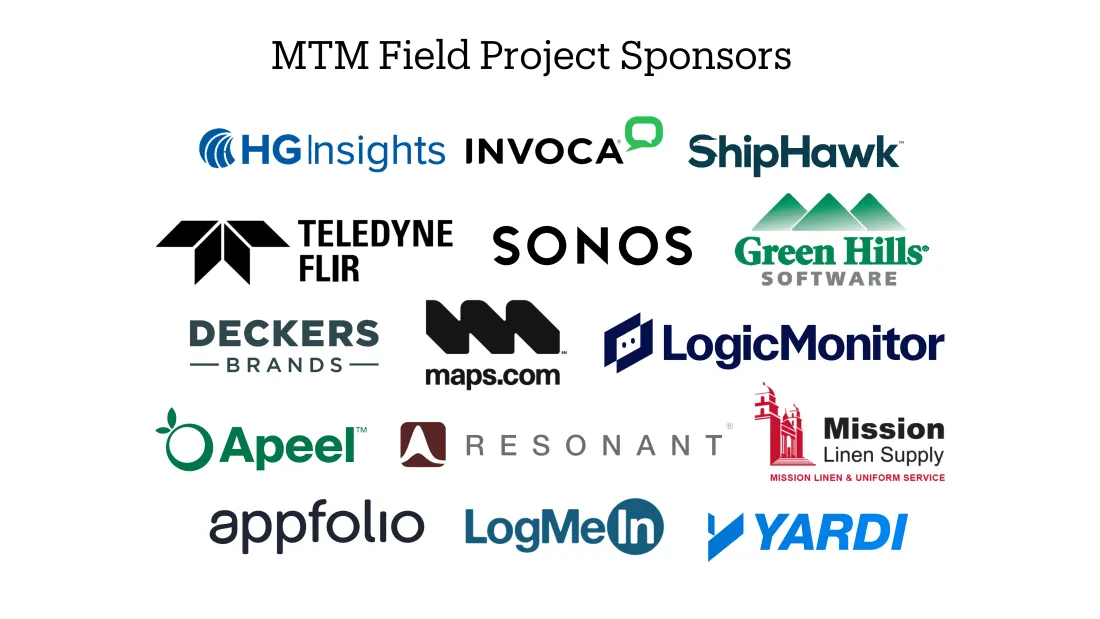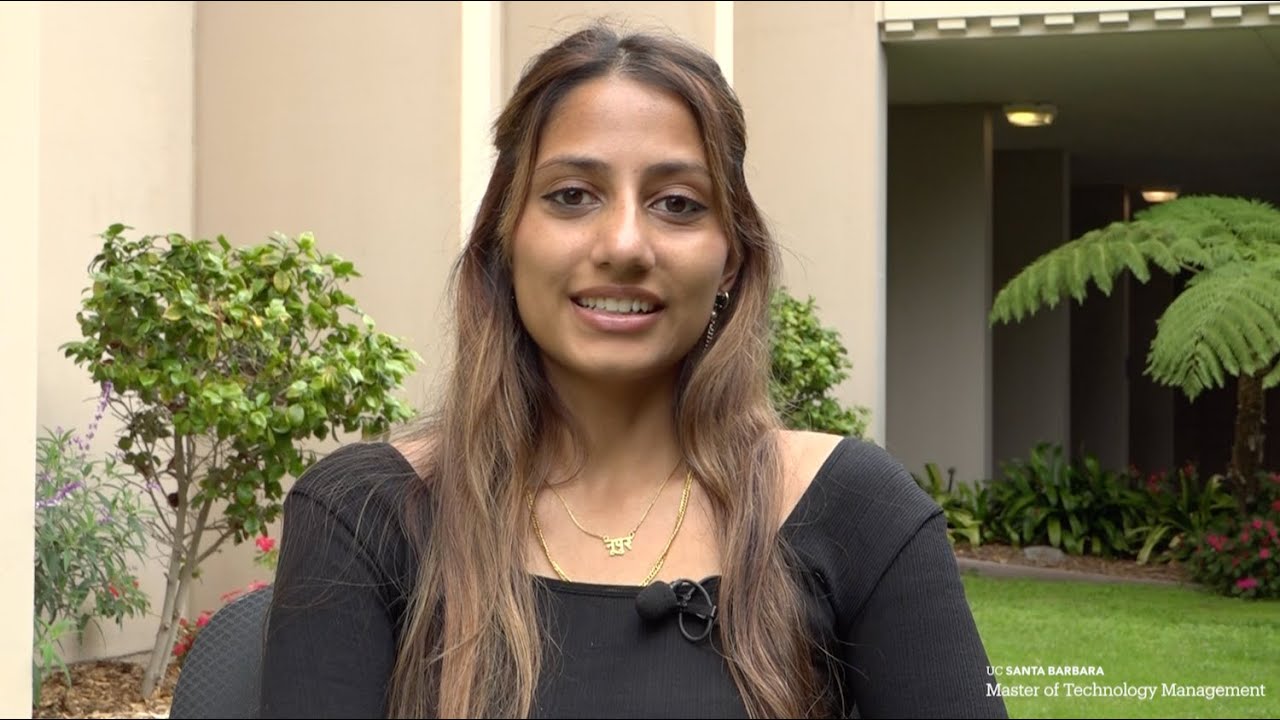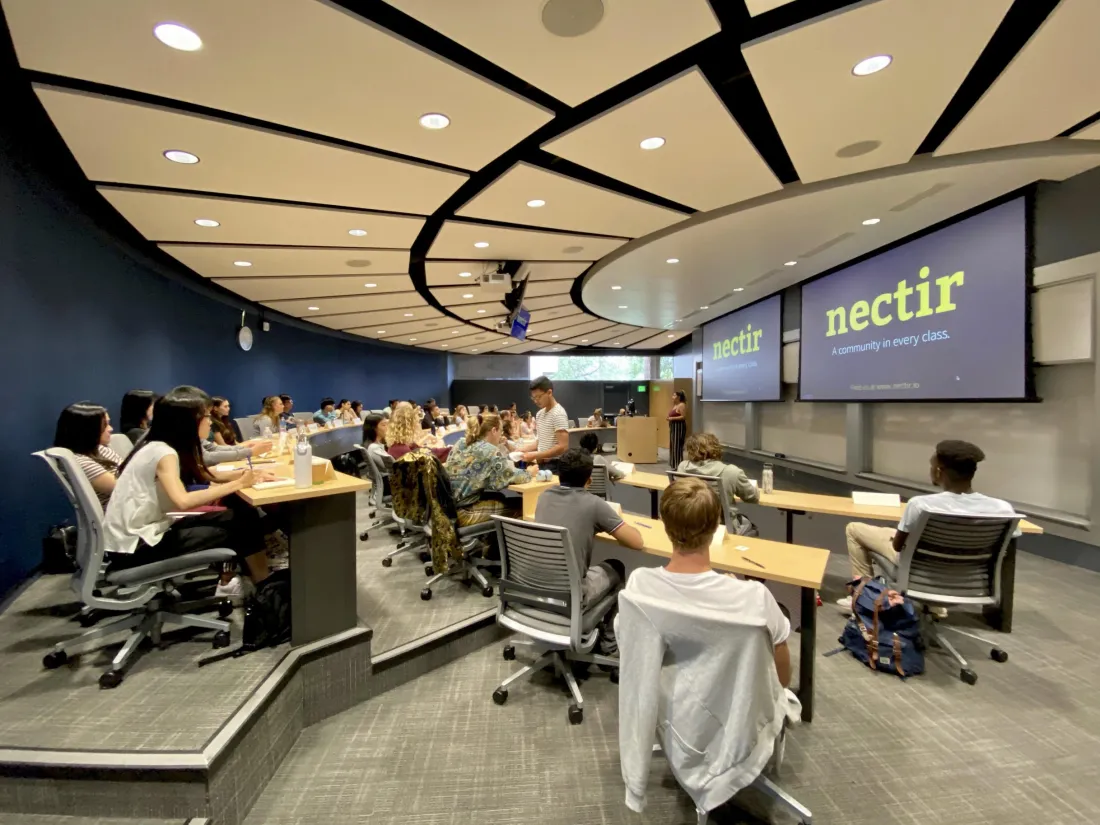MTM Academics
Master of Technology Management (MTM) graduate students complete a rigorous curriculum, including coursework and a field project, that prepares them to succeed in the fast-paced and challenging environment of technology-driven firms. The MTM program provides students the skills and knowledge to apply data analytics in decision making, to work with intelligent machines to solve challenging problems, to organize and manage technology teams in the unique environment of a technology-driven firm, and to apply an entrepreneurial mindset to identify and capitalize on new business opportunities.
A Master's Degree For the Digital Age
What is technology management? Technology Management is defined as the study of how technology-driven companies effectively manage the challenges and opportunities created by technological change. At the core of Technology Management are the key ideas about technology-enabled innovation, digital transformation, and leadership practices that are needed in order to adapt to change, continuously innovate, and drive competitive advantage. These serve as the foundation for the Technology Management master’s degree curriculum.
Over the course of one academic year, Master of Technology Management students enroll in a core curriculum that provides the foundational business knowledge required to navigate technology-driven firms. The core MTM management curriculum is complemented by other required coursework that enhances students’ ability to leverage data to better organize teams for continuous innovation. Coursework is completely focused on the tech management skills needed to lead multidisciplinary teams. Over winter and spring quarters, students will apply these strategies and skills through a consulting field project, in which they will work with a team of fellow students, faculty advisor, and company advisor within a technology company to solve a contemporary business challenge. The total number of units required to complete the MTM degree is 42 units.
UCSB Master of Technology Management Curriculum
Fall 2024
TMP 466 - Negotiation for Technology Managers (Prof. Renee Rottner, 4 units): Students will learn about the science underlying the social dynamics of negotiations and gain insights into their own preferences, how to prepare for negotiations, and also have the opportunity to practice applying these lessons in role-play simulations. By the end of the course, students will have greater understanding and confidence in their abilities to create and claim value through negotiations in their personal and professional life.
TMP 464 - Learning to Work with Intelligent Machines (Prof. Matt Beane, 4 units): Through unconventional, practical use of AI, this course explores research-backed approaches that will help students develop skill with intelligent technologies. Students will develop the know-how required to design work that brings humans and intelligent technologies together to produce more valuable outcomes than they could apart.
TMP 412 - Strategy for Technology-Driven Companies (Prof. Nelson Phillips, 4 units):
In this course, students will begin with an exploration of traditional competitive strategy. After reviewing this traditional approach, the course focuses on how strategy is more and more about where a firm will focus its innovation efforts and how it will innovate faster than its competitors, as well as about how a firm deals with tech management in terms of what technologies to choose, how to deploy them, and which technologies to purchase and which to develop in house.
TMP 491PC - Professional Skills & Career Readiness (Dr. Erin Nerstad, 2 units): In this course, master’s Technology Management students will learn skills such as how to communicate in the workplace, read financial statements, and use Excel effectively. Students will also participate in career readiness activities such as building LinkedIn profiles, networking, crafting elevator pitches, and career exploration to prepare them for careers in tech management.
Winter 2025
TMP 491C - Communication (Prof. Eric Zackrison, 4 units): This course teaches students the fundamentals of business communication for technology management and develops skills for crafting and delivering persuasive and effective messages to different audiences.
TMP 422 - Data & Decision Analytics (Intro & Advanced) (Prof. Jessica Santana, 4 units): Students will learn about theoretical models and mathematical tools for quantitative analysis, statistics, decision theory, and management. They will also learn how various business situations are modeled and optimized effectively using mathematical modeling and quantitative techniques.
TMP 463 - Entrepreneurship (Prof. Mary Tripsas, 4 units): This course covers the fundamentals of entrepreneurship, including product ideation, forming and building a startup team, market validation, business model development, go-to-market strategies, capital acquisition, and building competitive insulation for technology management professionals.
TMP 499 - Field Projects (Prof. Eric Zackrison, 2 units): In this course, students work in teams under the direction of a faculty advisor and industrial sponsor to tackle a real-life management consulting project. The course emphasizes practical, hands-on experience, and integrates skills acquired in courses completed in previous quarters.
Spring 2025
TMP 402 - Digital Marketing (Prof. Nels Henderson, 4 units): This course provides a high-level overview of the digital marketing skills needed to succeed in today’s competitive business environment. The course will cover topics including search engine optimization, content marketing, social media marketing, and marketing data analytics.
TMP 465 - Digital Transformation (Prof. Paul Leonardi, 4 units): Digital transformation creates the opportunity to radically change the way work is done so that organizations can continue to grow and compete. This course provides a detailed framework for implementing digital transformation to enable fundamental organizational change.
TMP 442 - Leading Technology Teams (Prof. Nelson Phillips, 4 units): Technology firms rely on teams for critical R&D and project work. In this course, students will develop practical skills to leverage team-based capabilities and avoid the pitfalls of teamwork, as well as hone their team leadership and teamwork skills through case analyses and experiential exercises.
TMP 499 - Field Projects (Prof. Eric Zackrison, 2 units): This is a continuation of TMP 499 from the previous term.
Hands-On, Real-World Experience
MTM provides students the opportunity to gain practical experience and work with a team composed of fellow Masters in Technology Management students, a faculty advisor, and a company representative on a consulting project. Students apply strategies and skills gained from coursework to solve a business challenge a technology-based company is facing. Assigned faculty advisors provide constructive feedback to enhance individual performance and team effectiveness.
Past projects include human capital management, product-market validation, and technical innovation related to audio technology, biotechnology, property management, and fashion. Field projects and teams are coordinated by the MTM faculty and take place in new ventures and established companies. Field project partner companies often hire MTM students after field project completion.

Beyond field projects, the Technology Management department provides a wide array of co-curricular and professional development opportunities for MTM students. In addition to personalized career development advising, MTM students are able to participate in the New Venture Competition, guest speaker events, and networking opportunities.
Learn more about MTM Career Development Opportunities and Job Outcomes here.
New Venture Competition
The New Venture Competition (NVC) started in 1999. Since then, it has become the premier tech entrepreneurship event on California's Central and South Coast. The NVC attracts investors from all over California, from Silicon Valley to San Diego. The NVC serves as an opportunity for MTM students to get exposure for your startup idea. You also get rigorous feedback from tech experts who help you determine whether your startup idea is marketable and investment-worthy.
Guest Speakers
We are committed to offering you an enriching experience enhanced by the wisdom of industry leaders. These guest speakers, including many successful Master of Technology Management alumni, return to share their valuable insights with you. They cover a wide range of topics, from the intricacies of breaking into product management, to strategies for career development, and the unique challenges of starting your own venture.
Networking
Our MTM program focuses on unlocking your professional potential through diverse networking opportunities. In person and virtual events connect students with industry professionals, peers, and alumni, fostering valuable connections.
Beyond events, our dedicated career services team provides detailed strategies and step-by-step guides for expanding and nurturing networking relationships. Active participation in the vibrant MTM alumni network opens doors to valuable experience and career opportunities. We go beyond campus, promoting local networking and industry events for students to build connections within the broader professional landscape. Recognizing networking as a pathway to success, the Masters of Technology Management program is committed to empowering students for thriving professional journeys.
Meet Nupur, MTM 2024
Originally from Washington State, Nupur joined the MTM program to launch a career in technology-driven businesses after completing her undergraduate degree in business management information systems. Hear from Nupur about the MTM cohort experience, engaging faculty, working on a company field project, and studying in sunny Santa Barbara.
Technology Management is a multidisciplinary field of science that examines the opportunities and challenges of technological innovation, industry disruption, and organizational change, and their influence on business performance and competitive advantage.
There are different types of master’s in technology degrees. Master of science in the management of technology and IT management master’s degree programs are designed exclusively for those with engineering and STEM backgrounds. MBA technology management degrees are for applicants with at least several years of work experience and have a broader curriculum covering a variety of business topics and industries. These master’s in technology, IT management master’s, and MBA in technology management degrees usually take 12-24 months to complete. The unique position of the UC Santa Barbara technology management master’s degree is that all of our curriculum is focused on the technology business context and application. You’ll learn the business skills of an MBA but with the focus needed to excel in technology-driven industries. Moreover, our graduates are able to pursue a range of careers beyond technical and support specialist roles. One of the top skills needed to lead in an increasingly diverse and global workforce is experience managing diverse teams. In UCSB’s MTM, working within our diverse cohorts with students of STEM and non-STEM backgrounds, from a range of work experience, and from different localities will hone your skills in leading teams and managing clients and stakeholders. Plus, you’re ready to launch into your next job in just nine months due to our focused curriculum that enables you to complete your master’s in technology management in three academic quarters.
The Master of Technology Management curriculum is a rigorous 9-month program that draws upon research and education at the intersection of technology, business, and social science. The MTM program explores product and corporate strategy (theory and practice), the management of products, projects, and teams, and the various methodologies for growing and scaling technology- and innovation-driven businesses.
The MTM management of technology curriculum includes a field project in which student teams have the opportunity to experience the practical application of theories and concepts learned. Many MTM students also choose to participate in Technology Management’s annual New Venture Competition which provides the opportunity to take a deep dive into forming and building viable startup businesses that address real-world challenges and opportunities.
In the fall quarter, students will enroll in foundational business coursework that paves the way for the remainder of the curriculum. In the winter quarter, students will learn how technology- and innovation-driven companies employ data and strategy for effective decision-making and to lead global teams for continuous innovation.
Over the winter and spring quarters, students will apply the theories learned through a consulting field project in which they will work with a team of fellow students, a faculty, and a company advisor within a technology company to achieve a contemporary business challenge. The total number of units required to complete the MTM degree is 42 units.
Many people consider going to graduate school for a master’s degree in technology management, a master of science in management technology, or an MBA. While there are some similarities in curriculum and focus across technology management MBA programs, a master in technology management degree from UCSB is a rigorous, 9-month program focused on launching early- and mid-career professionals into careers in tech, IT management, product management, entrepreneurship, and beyond.
Additionally, the MTM differs from MBA technology management online programs because of its cohort-based educational experience. Our students and alumni (like Shelby and Ken) have shared that the cohort experience is one of the most impactful and memorable aspects of the MTM program, and the connections you’ll forge during your MTM year are ones that will continue to serve you both personally and professionally for years to come.
The master’s in Technology Management at UC Santa Barbara is an ideal program for those interested in the intersection of technology, innovation, and management. If you are an engineering or IT professional looking to enhance your technology management skill set, or if you do not have a STEM background and want to launch a career in tech, consider applying to the MTM program. If you have questions about applying for a master’s, Technology Management, or the MTM application, please get in touch with our admissions team: Click here to show mail address
No, all admitted Technology Management master’s students start together in the fall quarter, which begins at the end of September.
The Masters inTechnology Management is a time-intensive, rigorous graduate degree program. Success in the program requires that students attend all classes (which occur during the day), work collaboratively on teams, and keep up with their studying. Therefore, full-time employment would be very difficult.
The Master of Technology Management is designed for completion over three consecutive quarters, or nine months. Required coursework (42 units) is not offered every quarter and progresses in a strategic order to culminate with a field project.
The Masters in Technology Management is an in-person program. MBA technology management online programs or master of science in management technology online programs may be a better fit for you if you are searching for an online degree program.
We kindly ask that you do not reach out to MTM’s professors due to the large number of applications we receive. To speak with a current MTM student, email Click here to show mail address. You can follow MTM on Instagram and keep up with UCSB Technology Management faculty and students on LinkedIn.
MTM is the degree name of the Master of Technology Management. Unlike a Master of Science in management of technology (MS), a technology management MBA, or a master’s in IT management, the MTM degree is tightly focused on the intersection of technology, innovation, and management, empowering professionals to drive strategic growth. Unlike other MTM programs, the UCSB master’s in technology management welcomes students from a variety of STEM and non-STEM backgrounds and includes students with and without engineering training and experience.
Apply to the Master of Technology Management Program
The UCSB Graduate Division application portal will open in September 2025 for Fall 2026 admissions.
For specific admissions questions, please reach out to our Admissions Team at Click here to show mail address or book an appointment here! You may also reach out to a grad assistant at this email: Click here to show mail address.
Are you a UCSB alumni or soon-to-be graduate? You can apply for the MTM program for free! Learn more and submit an application fee waiver request.
Admissions Deadlines
December 1, 2024 (Priority Consideration)
February 1, 2025
March 1, 2025
All applications are due by 11:59 PM Pacific Time on the day of the deadline.
We strongly encourage applicants to apply early. We recommend that international applicants apply by December 1, 2024 to allow sufficient time for visa requirement processing if admitted.






 Instagram
Instagram LinkedIn
LinkedIn Twitter
Twitter